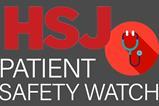HSJ hosts the Patient Safety Watch newsletter, written by Patient Safety Watch chair Jeremy Hunt.
Good afternoon, and welcome to this fortnight’s edition of the Patient Safety Watch newsletter, which this week is written by Jeremy Hunt MP.
Firstly, a quick mention that I’m delighted to have rejoined Patient Safety Watch as trustee and chair. I had to step down from this position in 2022 when I became chancellor, but always intended to get involved in patient safety issues again when the circumstances allowed. From now on you will have the dubious pleasure of hearing from me once a month…
With that out of the way, let’s get stuck in.
Hitting the target but missing the point?
As reported by the BBC and elsewhere, health secretary Wes Streeting told the NHS Providers conference in Liverpool last week that league tables will be used to reveal failing hospitals and managers will be fired if they fail to turn things around. I suspect Mr Streeting’s messaging was more nuanced than some of the media has reported, but as I said in my question in Parliament this week, the NHS is already the most micromanaged large healthcare system in the world, with NHS managers already having more than 100 central targets to meet.
Sacking bad managers is not the answer. Of course, if someone fails, they should go. But the bigger question we should ask is why our system makes it so difficult for anyone to become a good manager. Hospitals have NHS England targets, Care Quality Commission targets, local integrated care board targets and numerous reviews to implement. Taken together they have the impact of depriving managers of the autonomy to deliver the transformational change the NHS needs. Nor is it much better for GPs, with more than 80 quality and outcomes framework targets.
Mr Streeting’s answer to my question showed he understands the dangers of a target culture. But even with a small number of targets, Mid Staffs happened because the managers there thought they would get foundation status if they hit four hours, 18 weeks and financial balance. In the process, horrific corners were cut so we mustn’t just turn the clock back.
As Sir Robert Francis said: “This failure was in part the consequence of allowing a focus on reaching national access targets, achieving financial balance and seeking foundation trust status to be at the cost of delivering acceptable standards of care.”
In other news this edition…
Government launches new review of physician and anaesthesia associates
The health and social care secretary has launched an independent review of physician associates and anaesthesia associates to consider how these roles are deployed across the health system and make sure patients receive the highest standards of care. The review will be carried out by the absolutely brilliant Gillian Leng, who used to run the National Institute for Health and Care Excellence.
I pushed PAs through when I was health secretary but the way they are used needs to be safe. What intrigued me then was the way traditional opposition from doctors had been replaced with an understanding that anything that safely reduces the pressures on frontline clinicians is to be welcomed. I look forward to what Professor Leng says.
Mental health patients harmed by being sent to units far from home
A report from the Health Services Safety Investigations Body, published this week, has warned mental health patients in England are being harmed because they are being placed in psychiatric units far from their homes and families.
The HSSIB report linked out-of-area placements to increased length of stay and increased anxiety, while the transport could even induce post-traumatic stress disorder. The report further noted that hospitals often did not maintain oversight of the patients they sent out of the area, leaving them forgotten and effectively abandoned.
I remember Tim Kendall made good progress in reducing out-of-area placements before, but the job is clearly not done. And I have always thought we should be bolder in adopting the Trieste model that eliminates the long-term use of psychiatric hospitals. More humane and much cheaper too…
Sexual harassment rife in ambulance service finds investigation
An investigation by Sky News has uncovered a culture of toxic behaviour among ambulance staff, including sexual harassment of colleagues and patients. The broadcaster revealed that paramedics account for 64 per cent of all investigations into sexual harassment against colleagues undertaken by the Health and Care Professions Council, despite making up just 11 per cent of its membership.
The issue obviously needs sorting out because as HCPC chair Christine Elliott said: “This is all about patient safety. Patients need to know when they see a practitioner, they can rely on them giving the best care possible with the best behaviour possible.”
Failures identified in inquest for woman’s death
BBC News has reported that the inquest for 46-year-old Nicolette McCarthy, who died in September 2023 while an inpatient at a mental health centre, has found there were missed opportunities to avoid her death. Ms McCarthy went missing after she was allowed to take a short break by herself, despite having expressed suicidal thoughts.
It is obviously a very tragic case but begs a larger question: should we have any suicides at all by mental health inpatients? Joe Rafferty has done some brilliant work at Mersey Care Foundation Trust (which was not the trust involved in this case) based on his determination to get to zero suicide and courageously said the same should also be true of outpatients. The latter is of course more challenging, but as a start should CQC inspections not look more closely at inpatient suicide rates?
Parliamentary report finds variation in approaches to pre-term birth
A report from the House of Lords’ preterm birth committee has found variations in how hospitals and regions implement clinical guidance on pre-term birth, as well as disparities in preterm birth rates and outcomes across different socioeconomic and ethnic groups.
Pre-term birth committee chair Lord Patel said: “We heard stark evidence on the impact of pre-term birth, which can be sudden and unexpected. While many babies born prematurely go on to do well, for some children and families pre-term birth has significant, and lifelong, adverse consequences.”
How then do we get all trusts to adopt the best practice of a few? Over to the Penny Dash review of the patient safety landscape…
Watchdog launches consultation on medical devices
The Medicine and Healthcare Products Regulatory Authority has launched a consultation on possible changes to the requirements a medical device must meet before it is available to the UK market, ahead of legislation which is expected to go to Parliament next year.
This follows a 2021 consultation on the same topic but focuses on four areas which have evolved significantly since then and is also in response to the Independent Medicines and Medical Devices Safety review (also known as First Do No Harm): UKCA marking, international reliance, in vitro diagnostic devices, and assimilated EU law.
The consultation will run until 5 January 2025.
Hundreds of patients received wrong or no treatment after trust missed the warning
More than 200 interstitial lung disease patients at Epsom and St Helier University Hospitals Trust either did not have their condition investigated properly, were given no treatment or the wrong treatment, or were not properly referred onwards after the trust failed to act on a 2019 Datix report, HSJ has reported. The trust has linked the failures to one consultant, who has already left the organisation and was referred to the General Medical Council this September.
In a report to the St George’s and Epsom and Helier boards, group chief medical officer Richard Jennings said: “In retrospect, it is clear that these concerns were not sufficiently looked into at the time they were first raised in 2019, although part of the reason for this is certainly the onset and extreme disruption of the pandemic (which particularly impacted the respiratory team and coincided in time with the raising of these concerns).”
And because it’s not all bad news, now sharing some good stuff…
Bluesky Thinking
If you are active on social media, you may have noticed the exodus of people moving from ‘X’ over the last few months. The latest high-profile patient safety organisation to do so is HSSIB, which gave its reasons here. The good news for anyone worried that this might make it harder to keep track of patient safety developments is that HSSIB and others (including Patient Safety Watch and HSJ) have now opened social media accounts on the (relatively new) Bluesky platform. If you have a Bluesky account, a useful starter pack of patient safety people and organisations who are already on the platform is available here.
New Patient Safety APPG!
Finally, I’m very pleased to be able to announce a new All-Party Parliamentary Group on Patient Safety to which I’m thrilled to have been elected as chair. Anna Dixon, who worked with me on quality at the Department of Health, is now a Labour MP and has kindly agreed to be vice chair. The new APPG will focus on improving patient safety across health and social care and will work to identify and promote best practices, address barriers to progress, and advocate for policy changes to support a safer health and social care system. More details about the APPG are available here.
That’s all for this newsletter from me. Please look out for our next newsletter from James in two weeks’ time.
Jeremy Hunt































No comments yet